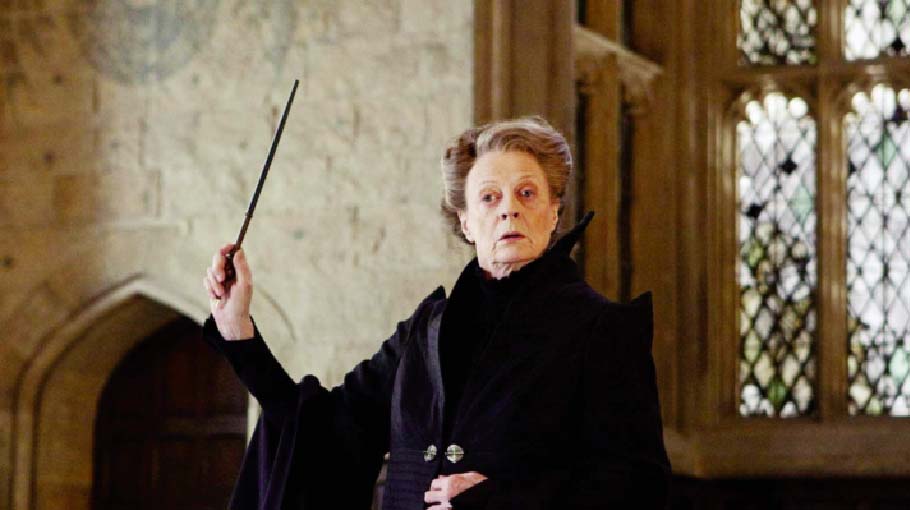Mourning the death of Oscar-winning British actor Maggie Smith

Maggie Smith, one of the most acclaimed actresses of her generation, died on September 27, 2024, at age 89. Sons Toby Stephens and Chris Larkin said in a statement that she died peacefully in a hospital surrounded by family. In a career that had remarkable range, Smith worked steadily over a period of more than seven decades in film, television, and theatre.
Maggie Smith was a two-time Academy Award winner; her first Oscar was for The Prime of Miss Jean Brodie, in 1969, and her second for California Suite in 1978. Since then, she has won numerous other awards, including BAFTAs, Golden Globes, and an Emmy for her iconic portrayal of Violet Crawley, the Dowager Countess, in Downton Abbey.
To many fans worldwide, though, she was perhaps most cherished as Professor Minerva McGonagall in the Harry Potter film series. As the strict but compassionate head of Gryffindor House, Smith lent her role depth and warmth, turning an entirely new generation into her fans. The sharp wit and commanding screen presence in the iconic definition of the role even helped pin McGonagall down as one of the most memorable figures in modern cinema.
Whether it was with the title roles of Shakespeare's great heroines, the hilarious film parts in Sister Act, or the more subdued dowager in Downton Abbey, her career showed an amazing versatility for Smith. She will be remembered not only by the iconic roles she played, but also by her peculiar way of bringing into every performance such complexity, grace, and strength.
After the news of the death of Dame Maggie Smith began to spread, fans across the globe started paying their respects and giving homages to the late acting great on all social media platforms. Tributes came forth from every corner of the internet, as she had a mammoth effect on multiple generations.
Her portrayal of Professor Minerva McGonagall, particularly in the Harry Potter series, has terribly moved many fans when they think of how she infused the character with strength and humor. Fans have taken to Twitter and Instagram to post messages of tribute. One said, "Maggie Smith was a huge part of my childhood. She made McGonagall come alive with such warmth and authority. A true legend who will be missed."
Others mentioned her versatility and celebrated the sway of a career that had taken her from early Shakespearean roles through award-winning performances in films such as The Prime of Miss Jean Brodie to her imperious turn as the Dowager Countess in Downton Abbey. As one fan shared on Reddit, "She could make you laugh one moment and cry the next. Few actors have the range and grace of Dame Maggie Smith. The world feels a little less bright today."
Nor did the outpouring stop at entertainment: Smith's influence on modern television and theater was also in wide evidence, from celebrating a fan who was marveling that Smith remained a fixture on screens deep into her later years, even dubbing her "one of the last greats" of British acting. As one post succinctly put it on X, formerly known as Twitter: "Dame Maggie Smith's wit, elegance, and sheer presence made her unforgettable in every role she played. Rest in peace-a true icon of the stage and screen."
Besides fans, a number of celebrities and co-actors also voiced their condolences; many reflected upon memories of working with her and called her an inspiration and mentor to younger actors. The whole world of entertainment is mourning the loss of one of its brightest stars.
AP adds; Maggie Smith, the masterful, scene-stealing actor who won an Oscar for the 1969 film “The Prime of Miss Jean Brodie” and gained new fans in the 21st century as the dowager Countess of Grantham in “ Downton Abbey” and Professor Minerva McGonagall in the Harry Potter films, died Friday. She was 89.
Smith’s sons, Chris Larkin and Toby Stephens, said in a statement that Smith died early Friday in a London hospital.
“She leaves two sons and five loving grandchildren who are devastated by the loss of their extraordinary mother and grandmother,” they said in a statement issued through publicist Clair Dobbs.
Smith was frequently rated the preeminent British female performer of a generation that included Vanessa Redgrave and Judi Dench, with two Oscars, a clutch of Academy Award nominations and a shelf full of acting trophies.
She made her film debut in the 1950s, won Oscars for work in the 60s and 70s and had memorable roles in each subsequent decade, including an older Wendy in Peter Pan story “Hook” (1991) and a mother superior of a convent in Whoopi Goldberg’s comedy “Sister Act” (1992).
A commanding stage actor, she played Shakespearean tragedy — 1965 adaptation “Othello” — and voiced Shakespeare-inspired animation in “Gnomeo & Juliet” (2011).
She remained in demand even in her later years, despite her lament that “when you get into the granny era, you’re lucky to get anything.”
Smith drily summarized her later roles as “a gallery of grotesques,” including Professor McGonagall. Asked why she took the role, she quipped: “Harry Potter is my pension.”
Richard Eyre, who directed Smith in a television production of “Suddenly, Last Summer,” said she was “intellectually the smartest actress I’ve ever worked with. You have to get up very, very early in the morning to outwit Maggie Smith.”
“Jean Brodie,” in which she played a dangerously charismatic Edinburgh schoolteacher, brought her the Academy Award for best actress, and the British Academy Film Award (BAFTA) as well.
Smith added a supporting actress Oscar for “California Suite” in 1978, Golden Globes for “California Suite” and “A Room with a View,” and BAFTAs for lead actress in “A Private Function” in 1984, “A Room with a View” in 1986 and “The Lonely Passion of Judith Hearne” in 1988.
She also received Academy Award nominations as a supporting actress in “Othello,” “Travels with My Aunt,” “A Room with a View” and “Gosford Park,” and a BAFTA award for supporting actress in “Tea with Mussolini.” On stage, she won a Tony in 1990 for “Lettice and Lovage.”
From 2010, she was the acid-tongued Violet Crawley, Dowager Countess of Grantham, in hit TV period drama “ Downton Abbey,” a role that won her legions of fans, three Emmy Awards, a Golden Globe and a host of other awards nominations.
But she chafed at television fame. When the show’s run ended in 2016, Smith said she was relieved. “It’s freedom,” she told The Associated Press.
“Not until ‘Downton Abbey’ was I well-known or stopped in the street and asked for one of those terrible photographs,” she said.
She continued acting well into her 80s, in films including the big-screen spinoff to “Downton Abbey” in 2019, its 2022 sequel “Downton Abbey: A New Era” and 2023 release “The Miracle Club.”
Smith had a reputation for being difficult, and sometimes upstaging others.
Richard Burton remarked that Smith didn’t just take over a scene in “The VIPs” with him: “She commits grand larceny.” However, the director Peter Hall found that Smith wasn’t “remotely difficult unless she’s among idiots. She’s very hard on herself, and I don’t think she sees any reason why she shouldn’t be hard on other people, too.”
Smith conceded that she could be impatient at times.
“It’s true I don’t tolerate fools, but then they don’t tolerate me, so I am spiky,” Smith said. “Maybe that’s why I’m quite good at playing spiky elderly ladies.”
Critic Frank Rich, in a New York Times review of “Lettice and Lovage,” praised Smith as “the stylized classicist who can italicize a line as prosaic as ‘Have you no marmalade?’ until it sounds like a freshly minted epigram by Coward or Wilde.”
Smith famously drew laughs from a prosaic line — “This haddock is disgusting” — in a 1964 revival of Noel Coward’s “Hay Fever.”
She repeated the gift for one-liners in “Downton Abbey,” when the tradition-bound Violet witheringly asked, “What is a weekend?”
King Charles III and his wife Queen Camilla paid tribute to Smith, who was made a Dame Commander of the British Empire, the equivalent of a knight, by the late Queen Elizabeth II in 1990.
“As the curtain comes down on a national treasure, we join all those around the world in remembering with the fondest admiration and affection her many great performances, and her warmth and wit that shone through both off and on the stage,” they said in a statement.
Fellow actors paid tribute to her on Friday. Hugh Bonneville, who played the son of Smith’s character in “Downton Abbey,” said “anyone who ever shared a scene with Maggie will attest to her sharp eye, sharp wit and formidable talent.”
“She was a true legend of her generation and thankfully will live on in so many magnificent screen performances,” he said in a statement.
Rob Lowe, who co-starred with her in “Suddenly, Last Summer,” said the experience was “unforgettable ... sharing a two-shot was like being paired with a lion.”
“She could eat anyone alive, and often did. But funny, and great company. And suffered no fools. We will never see another. God speed, Ms. Smith!” Lowe wrote on X.
Prime Minister Keir Starmer called Smith “a true national treasure whose work will be cherished for generations to come.”
Margaret Natalie Smith was born in Ilford, on the eastern edge of London, on Dec. 28, 1934. She summed up her life briefly: “One went to school, one wanted to act, one started to act, one’s still acting.”
Her father was assigned in 1939 to wartime duty in Oxford, where her theater studies at the Oxford Playhouse School led to a busy apprenticeship.
“I did so many things, you know, round the universities there. ... If you were kind of clever enough and I suppose quick enough, you could almost do weekly rep because all the colleges were doing different productions at different times,” she said in a BBC interview.
She took Maggie as her stage name because another Margaret Smith was active in the theater.
Laurence Olivier spotted her talent, invited her to be part of his original National Theatre company and cast her as his co-star in a 1965 film adaptation of “Othello.”
Smith said two directors, Ingmar Bergman and William Gaskill, both in National Theatre productions, were important influences.
Alan Bennett, preparing to film the monologue “A Bed Among the Lentils,” said he was wary of Smith’s reputation for becoming bored. As the actor Jeremy Brett put it, “she starts divinely and then goes off, rather like a cheese.”
“So the fact that we only just had enough time to do it was an absolute blessing really because she was so fresh and just so into it,” said Bennett. He also wrote a starring role for Smith in “The Lady in the Van,” as Miss Shepherd, a redoubtable woman who lived for years in her vehicle on Bennett’s London driveway.
However extravagant she may have been on stage or before the cameras, Smith was known to be intensely private.
“She never wanted to talk about acting. Acting was something she was terrified to talk about because if she did, it would disappear,” said Simon Callow, who performed with her in “A Room with a View.”
Smith married fellow actor Robert Stephens in 1967. They had two sons, Christopher and Toby — who both grew up to be actors — and divorced in 1975. The same year she married the writer Beverley Cross, who died in 1998.





